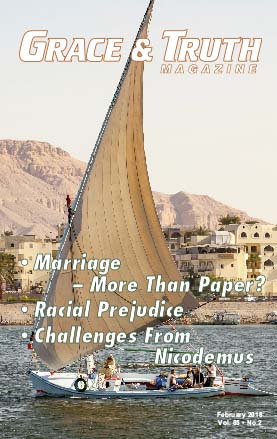
“Let marriage be held in honor among all, and let the marriage bed be undefiled; for fornicators and adulterers God will judge.” —Hebrews 13:4 NASB
By Eugene P. Vedder, Jr.
Marriage is the oldest of human institutions. It dates back to the garden of Eden, man’s first home, and was created expressly for man by God. Marriage was not man’s idea, but God’s. Contrary to what many people think, marriage was instituted by God for His glory and for man’s enjoyment and blessing. No piece of paper was involved in that beginning long ago; in fact, the first marriage was absolutely simple, consecrated by God Himself.
God shows us in His Word that human marriage, wonderful in itself, is a picture of something far more magnificent. God planned long before He created mankind, or even the earth on which we live, that human marriage was to picture the marriage of the Church to His Son, the Lord Jesus Christ. This marriage will soon take place in heaven. Although the Church was a mystery hidden by God and thus nowhere mentioned in the Old Testament, some pictures foreshadowing this glorious marriage are already given us there.
When we look at Ephesians 5:22-33 and other passages in the New Testament we see what marriage means to God. Therefore, we can well understand that He promises to judge anyone who deliberately spoils or abuses this depiction of His glorious purpose which He has also lovingly designed for man’s pleasure and benefit. Both fornication and adultery are deliberate acts involving the will of two individuals. God differentiates these sins from rape – the forcible sexual violation of one person by another. God’s Word does not, however, recognize any “accidental” commission of these sins! By contrast, God makes a distinction between murder and manslaughter in His Word. He provided cities of refuge in Israel for those who accidentally, or unintentionally, killed someone else; while for murderers there was no such provision made. Seven times in Numbers 35, God commands that the murderer must be put to death.
The model God gives to us to exemplify His ideal of marriage, as we have already noted in Ephesians 5, is that of Christ and the Church: “Christ also loved the Church and gave Himself for her” (v.25 KJV). He is the Head of the Church and the Savior of the Body. He sanctifies, cleanses, nourishes and cherishes her – loves her as His own body. One day He will present her to Himself in glorious, splendid, spotless beauty. What a wonderful example He gives in this way to husbands, who themselves are exhorted to love their wives as Christ loved the Church. The Church in turn is subject to Christ and respects Him, a subjection and respect that are not forced on her but that comes from the depths of her heart. This is the example for wives who are to be subject to their own husbands in everything as to the Lord.
Marriage, in this way, is a relationship built to the utmost degree upon giving. It is not based on getting – but oh, how much each one gains by this wholehearted, unreserved giving. Christ gave Himself; He gave His life. In fact, He, God the Son, the Lord of Glory, stooped to become Man in order to be able to give His life. The Church is to be His eternal Consort,* whom God (looking back to the picture given us in Genesis 2) designed to be a help perfectly suited for her husband. Being made by God as a product of the Son’s death, she submits to Him with full respect in everything as a part of Him. Such is God’s ideal for marriage.
Only A Piece Of Paper?
Marriage is certainly more than a piece of paper! What is this expression, “a piece of paper,” all about? Sad to say, more and more people today are rejecting what God tells us about marriage. Many people in today’s world think there is nothing wrong with a man and a woman simply living together without being married. Some give reasons why they prefer this “free lifestyle” to the bonds taken on in a legal marriage. They ask why two people who love each other should have to go through the formality of getting legally married. Many feel that without the legal constraints of being married they are not tied down to only one person, or they are free to move on when they are no longer in love or it no longer suits them to live together. Just how is it that a piece of paper called a “marriage certificate” or a “marriage license” makes a marriage legitimate? “Isn’t love the main thing?” they ask. What connection does love have with a piece of paper?
The piece of paper itself is not the important thing, but what it stands for is absolutely vital. God has established marriage as a relationship whereby a man and a woman are united together before God and man, as husband and wife. In creation, God had made the woman out of the rib He had taken from the man, whom He had caused to fall into a deep sleep, and had brought her to Adam. Scripture then immediately says, “Therefore a man shall leave his father and mother and be joined to his wife, and they shall become one flesh. And they were both naked, the man and his wife, and were not ashamed” (Gen. 2:24-25 NKJV). From this point on the woman is referred to either as “the woman,” “Adam’s wife,” or “Eve” after Adam gave her that name. She was not his “girlfriend,” “significant other,” “mistress,” “concubine,” “fiancée,” or “roommate.” No, she was his wife!
A wife in Scripture is a woman in a definite relationship to a particular man. This man has left father and mother; thus he is no longer under their authority. He has left them to be joined to his wife in a profound new relationship that is referred to by several expressions that involve both the sexual union and the intimacy that goes beyond physical union: “knowing her,” “becoming one flesh.” In fact, the expression used of being naked and not ashamed indicates the liberty of complete openness, without any reserve between husband and wife. In marriage, “yours” and “mine” fade into the background while “ours” shines out bright and clear.
We do not find any reference in Scripture to a wedding ceremony, but weddings in God’s Word are usually associated with feasts — sometimes, as in Samson’s case, lasting for several days. Thus, a wedding was a definite event, normally a joyful one, that marked a public change in the status of the two individuals involved. These two – always a man and a woman – thereby became husband and wife.
While custom in today’s world usually places the emphasis on the bride, this was not so in weddings recorded in the Bible. There the emphasis is normally on the bridegroom, for the bridegroom pictures Christ. In the account of the first wedding in the garden of Eden, God created the woman for the man to be his helpmate.
That first marriage was respected throughout the Bible. This was true even of wicked men beginning with Cain and his descendant Lamech in Genesis 4. Incidentally, this Lamech is the first polygamist mentioned in God’s Word. In time other perversions have also damaged the marriage relationship that God began in purity and simplicity. Godly men in Scripture, sad to say, also are often seen involved in polygamy although they honored the institution of marriage. Sexual intercourse outside of marriage is always viewed as sin in God’s Word. Sleeping around and prostitution are always wrong, for sex was not given to mankind as a toy with which to play.
Sex within marriage is not only for procreation, but it is pleasurable and is commended in Proverbs 5:15-20 to the young man who has just been warned against the immoral woman. Other passages show us that sex within marriage is a fantastic gift from God, giving the married couple the ability to express their love and appreciation for each other in a physical way. This gift of God gives pleasure even when misused. However, God calls such misuse “fornication,” or when married persons are involved, “adultery”; and He absolutely condemns both of these sins.
Marriage is definitely more than a piece of paper. Why insist on that piece of paper then? God has appointed authorities in this world for our good. Before He did so, when man had no government but simply had his conscience to guide him, his wickedness increased until God intervened with the judgment of the flood. The Book of Judges gives us examples of the dreadful things that happened in Israel when there was no king, and every man did what was right in his own eyes. In the increasingly lawless world we live in, immorality is blatantly out in the open and is being promoted and protected, even called “right.” Yet for the good of society, governments are still recognizing and, to a certain extent, protecting the institution of marriage. We Christians are told in Romans 13, 1 Peter 2 and elsewhere to obey the laws that governments make and to pay the fees they demand. A license to marry is one of these. A marriage ceremony is another. These “pieces of paper” are a part of what governments require as they function under God to protect and promote marriage. They help to keep man’s passions in check and under control. We Christians should pay the fees they demand and obey their requirements as they act within the framework of the authority God has committed to them. In doing so we are obeying God’s Word.
Yes, marriage is more than a piece of paper – much more! But that piece of paper the government requires is an integral part of marriage in our countries, for it makes a marriage legal and openly recognized as being the bond that binds a man and a woman together while on earth. Marriages may be made in heaven, but heaven tells us to submit to the authorities it has established for man’s good on earth. We do this in obedience to our Lord Jesus Christ who has told us to render to Caesar the things that are Caesar’s and to God the things that are God’s.
ENDNOTE
* A “consort” is a “spouse, especially of a reigning monarch,” according to Dictionary.com.



